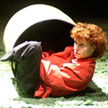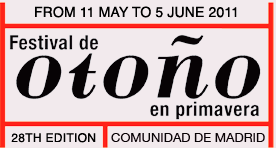
Theater an der Ruhr
KASPAR, by Peter Handke
Spanish premiere Language: German (with Spanish subtitles) Country: Germany Approx duration.: 2 hrs 30 mins (with interval of 20 minutes)


KASPAR, de Peter Handke
There is no place in the world that the indefatigable Theater an der Ruhr has not yet explored, driven by the insatiable political curiosity of its director, who won't run out of energy until the next millennium. This company is able to act at the highest artistic level answering an authentic cultural call, which is nothing else but its hunger for eroticism, visions, worlds and creative impulses.
- MARCO MARTINELLI, DIRECTOR AND CO-FOUNDER OF THE DELLE ALBE DE RAVENNA THEATRE
Kaspar Hauser was a German teenager who one day in May 1828 appeared on the streets of Nuremberg as if out of nowhere, without parents or family, dressed in rags, emaciated and terrified, repeating a single sentence: "I want to be a horseman like my father before me". The writer Peter Handke has turned this into the more universal statement: "I want to be someone like somebody else was once". Gradually, it became apparent that Kaspar's childhood had been spent in a dark room, cut off from all human contact. He was adopted by a series of public figures who attempted to "civilise" and to teach him. As he learned to speak and to operate as a member of society he struggled more and more to adapt to normal life. In his early 20s, he was stabbed by an unknown attacker, perhaps his original captor, and died. A film based on his life by German director Werner Herzog, The Enigma of Kaspar Hauser (1974), suggested that modern society simply cannot accommodate people which it itself has not indoctrinated.
In his work, Handke takes a more pessimistic view, portraying the identity of Kaspar as a metaphor for conformity and oppression, playing with the double meaning of the word "kaspar" which means "clown" in German. But Handke does not want to tell the story of popular legend. His Kaspar is a theatrical creation, a strange and disturbing game, the effect of which is amplified during the work through the use of megaphones and answering machines. The face of the actor who plays Kaspar looks like a mask depicting his astonishment. His inappropriate clothes, his hideous gestures and gait as well as some objects - which surround him but which he does not understand - are no more than just a small part of a great theatrical show at its best.

- Download full details (in Spanish) in PDF

- Madrid
- Teatro de la Abadía
- June 1 to 4
at 8.30pm




